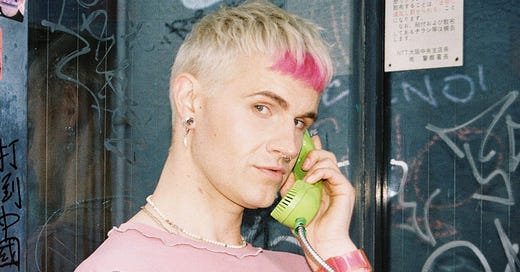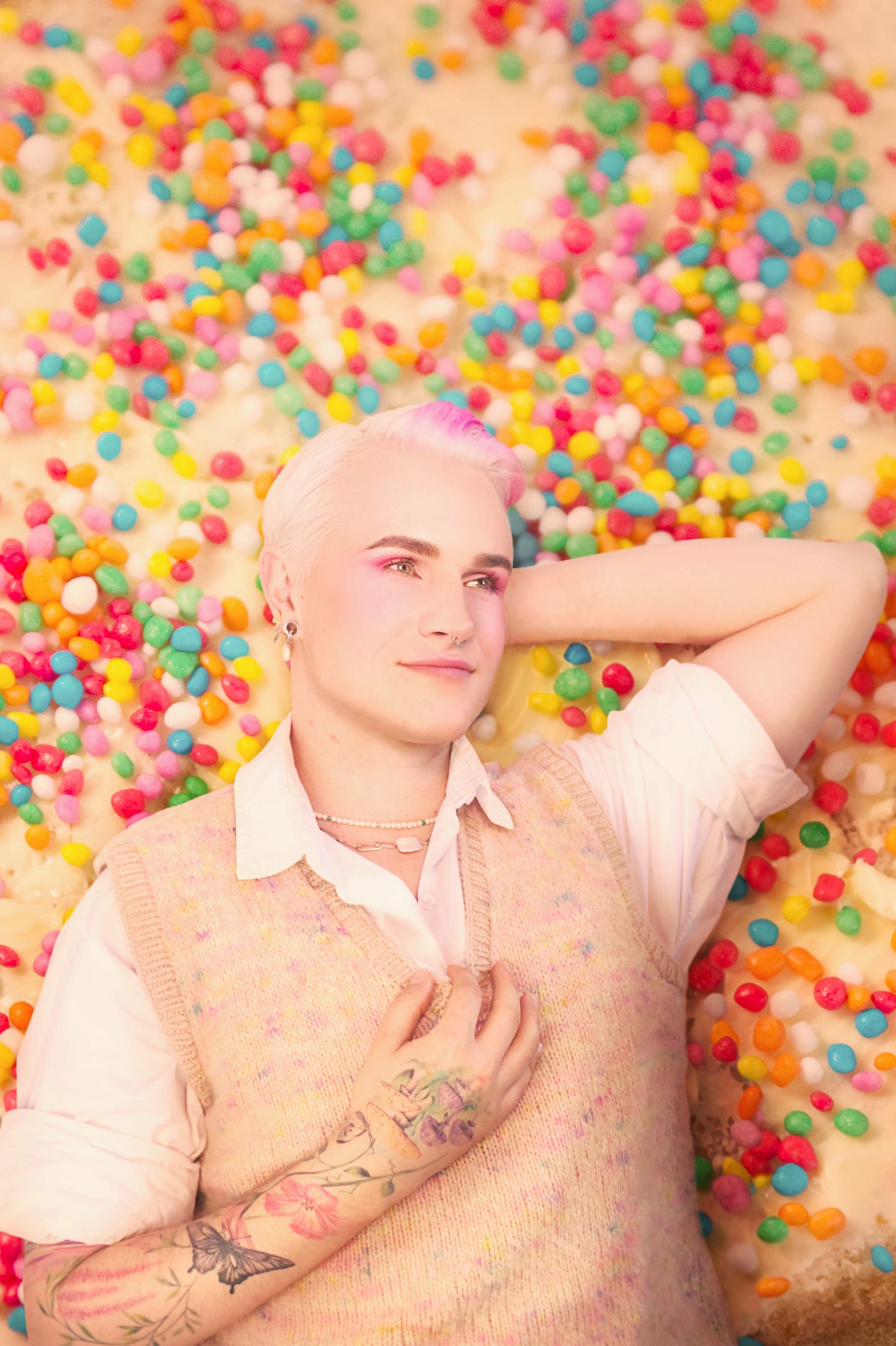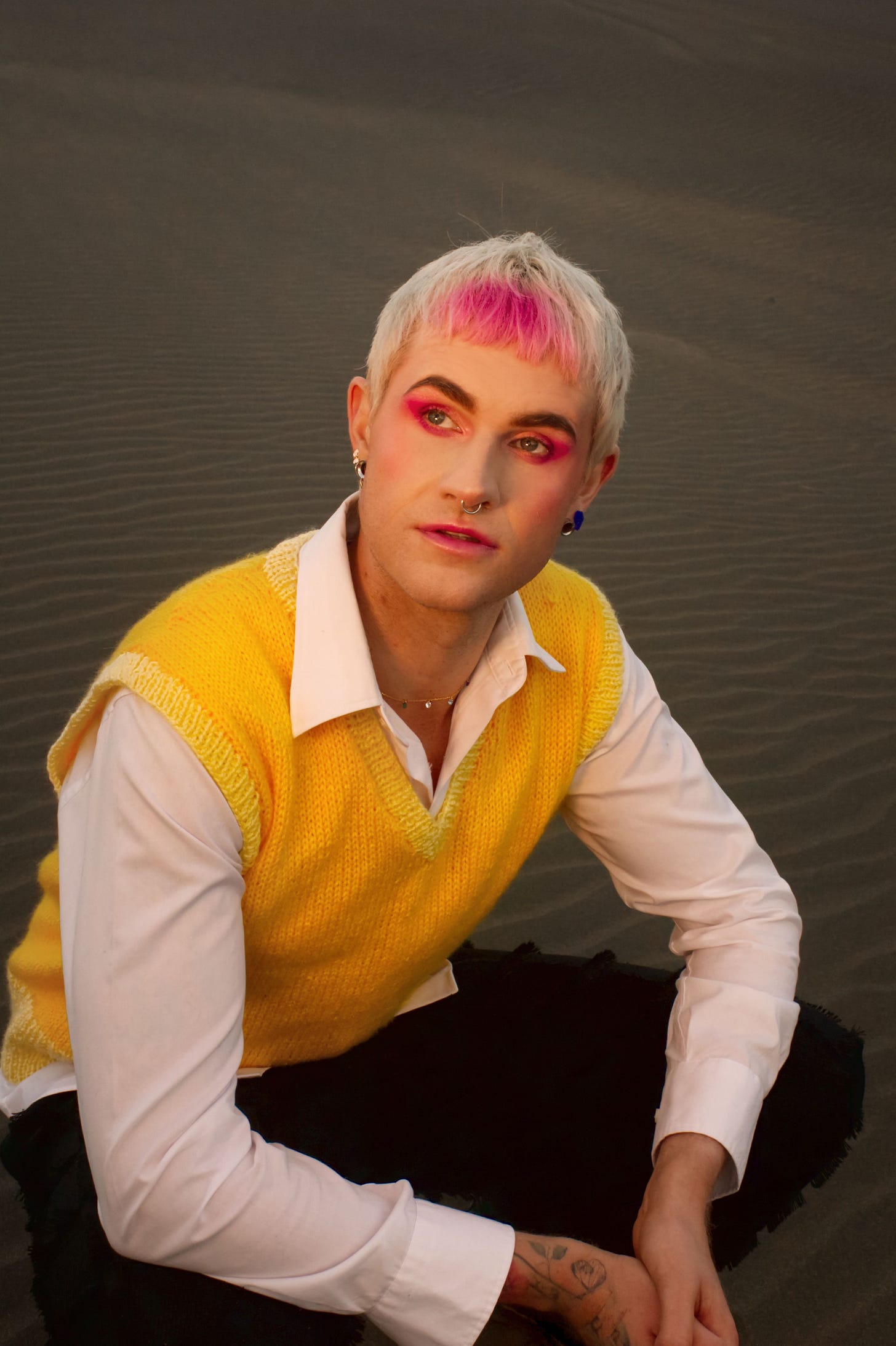An Interview with Jason Parker - INTERVIEW
Jason Parker's discusses how his new EP, Fairy Bread, is a sparkly addition to the pop star fantasy!
Hot off the release of his latest EP, Fairy Bread, Jason Parker joined us in the Ponsonby Foodcourt to discuss his journey through music, growing up in the country, and what it means to make Fairy Bread while living the pop star fantasy.
A. And I am now with Jason Parker, of Jason Parker fame.
J. Sounds like I’m from the Handmaid’s Tale — Ofjason! Haha!
A. So you grew up in the country?
J. I grew up in Waipukurau, Hawkes Bay, on a farm in Ongaonga. It's actually one of New Zealand's oldest settlements. I lived there until I was 18, and went to high school there and started singing there.
A. What made you fall in love pop music?
J. I think I related to the girls, you know. You will understand this, when you're young and queer, and you don't really know you're queer — you just know that you’re a bit more sparkly. I think pop music allows you to be like that in a way that is okay around other people. You can say, “I love Britney Spears’ new song” and people are gonna be like “Yeah, me too! Britney Spears’ new song is great!”
A. Was there a particular pop diva you were drawn to?
J. Christina Aguilera — 100%! Happy 15th anniversary to Burlesque.
A. What was it about Christina?
J. I was obsessed with the look, and I remember the first time I ever saw Dirrty — it was her Stripped album that was like, whoa! The first time I ever saw the Dirrty music video, I was at a pub with my dad, and I remember all the men being like, this is so risqué, and me being like, I think I'm in love. Growing up, I realised that I didn't love her, I just wanted to be her. And her vocals, like Celine Dion as well. Me and my mum used to listen to Celine Dion so much and It's All Coming Back To Me Now is just… I still hold space for it. I've always loved pop music — always!
A. When did you start writing songs?
J. I started seriously writing songs when I got back from Australia. I lived in Australia, and when I got back, I was really depressed, to be honest. I was working this job on a farm, and I was by myself a lot, so I just started singing to myself, literally at four o'clock in the morning, writing little songs. That's when I wrote You Rescued Me, and This Is My Year.
A. Did you know that you could sing before that?
J. Yeah, I've been singing since primary school. I used to put on talent quests. Atomic Kitten’s Whole Again — that was my winning song! I changed the lyrics. There's a lyric about if you see me with another man, but I changed it to if you see me with another woman. I did choreo and everything. There's a line in the song that says, turn around. So I turned around, but I got caught up in the microphone lead — it was kind of embarrassing. But I still took home the trophy… of an event I organised.
J. I've always been like this. I’m just allowing myself to actually put effort and time into it now that I'm older and know that this is something I really need to do. It has been really freeing. But I do just feel like everything I've done has led me back to what I was doing when I was a kid, which is ridiculous. It feels natural.
A. What made you audition for Popstars?
J. I actually got asked to audition. I was doing Kick Ons [podcast] and the producer emailed me. Honestly, it felt like a sign — I'd been talking to heaps of artists about how they made their way in the New Zealand music industry, and I was really inspired by these stories, because it felt like an impossible dream to want to be a pop star or a musician. And then once I realised that these people were doing it, I thought, oh my god — Popstars, this is it! And when it was a songwriting competition, I was like, I actually do write songs, just no one's heard them before. So let's see what happens.
A. Was it your first time recording music?
J. Well, yeah, I didn't even have anything recorded then. I literally just had a diary full of lyrics and on Popstars, I sang a cappella and I didn't even know anything, but I did think I was gonna win! I didn't know a single thing about the music industry. But I was like, this is for me. This is my moment… and it wasn't, obviously.
A. Well, you still won in a certain way.
J. I feel like, once I got eliminated, I was honestly so sad that I had to take time off work. I was so sad. It's like I was going through a breakup, because I was just so delusional, I believed I was gonna win. And then I just stopped and looked at myself, and I was like, why are you so sad? Because this is something you really want. You’re finally admitting to yourself that you really want to be a singer, you really want to write songs. You feel like this is a part of you that is missing. This was my winning.
A. It's that confidence in yourself to actually say, “This is my dream.”
J. It really is my dream. And I guess doing it, other people start getting the confidence to share their dreams with you as well. I don't know if you feel like that, but I feel like I've suddenly surrounded myself with other people who have these really big dreams, and everyone is just doing their best to support each other and actually make it happen.
A. What happened after that? After Popstars, what was the first single you released?
J. You Rescued Me — that was the song I sang in a cappella on Popstars. I got home, and I emailed Alvyn Tan, who ended up producing all of the How To Be Lonely EP. I started with one song, and then was like, let's go for two songs, let's go for three, let's try four, five, and then by that stage, I was very focused. I didn't know how I was gonna do it, but I was like, we're in this now — this is gonna work out.
A. And then how did Fairy Bread come about?
J. After How To Be Lonely, I decided that I needed to move to Auckland. I was living in Wellington, I'd been there for five years, and I decided to move to Auckland to give making music a real shot. On my way up, literally driving from Wellington to Auckland, I was like, I'm gonna call my next EP Fairy Bread. I don't know what that means, but I just think it’s a good idea. I wrote All Of You on that same drive, and then I got to Auckland, and I met up with Maude. I messaged a few producers, actually, and Maude seemed real keen. She was just so excited. I met up with her, with a few songs that ended up on Fairy Bread, and now it’s kind of a whole different EP. Lots of songs got ditched, because my whole life changed when I got here. I was in a new city. I had a boyfriend who I was falling in love with, and that started to influence Fairy Bread, as you hear it now.
A. Tell me more about your relationship with Maude. It’s really great seeing you guys become so close and perform together, and seeing your friendship get deeper with every step.
J. I feel so lucky. I honestly believe, and it's very woowoo, but the universe sent us to be together, like, right place, right time. Maude calls it quantum entanglement, which I love. And we just get on. We like the same music. We're both queer. We both grew up in Hawke's Bay. We just fit together so well, and Maude has taught me so much. Being in the studio with Maude has been so eye opening and so fun. And she really just believes in the fantasy in a way that it's her song, just as much as it's my song — we're making this together. I feel like, even though we're not a duo, it does feel like without Maude, there's no Jason Parker. Like you and Noah [Page]. Watching you and Noah perform together is just so cool. I can tell that he is really invested and really proud of you and finds it fun. It's his music too.
A. So then you got signed?
J. Yeah, to Bigpop.
A. Tell me about that experience.
J. Oh, it was so good. I had been going into Bigpop all year to record, because that's where Maude works. They do this thing on a Wednesday called Soup Wednesday, where everyone comes together and we all have lunch together. Whoever's in the building just comes and sits, and there's soup for everyone, and it's so nice. So I was going in on Wednesdays, and I spent a lot of time with the people at Bigpop. They were my little family, without them really knowing it, or me knowing that they knew it. At the end of the year, the label manager at the time, Zoe Larsen Cumming, said to me, “What's your release plan?” I said, “I've got no idea what I want to do.” And she said, “Well, maybe Bigpop could help.” And that set it in motion. In the new year, they sent me a contract, and I signed for the release of Fairy Bread and another project that'll come out next year.
A. Another secret project.
J. Being signed has just really given me the mental space to just focus on creativity in a way that when I was releasing How To Be Lonely, I didn't feel. I felt quite stressed the whole time being like, how am I going to do this? But now I'm like, I've got people believing in me, they're gonna help me do it. I feel really lucky, and they’re just a really cool group of people.
A. Do you feel like your songwriting has changed since you've been signed?
J. 100% — because I feel more free to try stuff. I guess when I started, my idea of songwriting was still quite limited because I hadn't actually written that many songs. Since being signed, I've been in the studio for hours and hours and hours, and I know what's possible. I just think that my ideas are coming from a different place as well.
A. So, Fairy Bread — what can you tell me about it?
J. White bread, butter, sprinkles. Do you know what though, I've always had it with margarine, which someone told me was psychotic, but I think it's more spreadable. You know, butter’s too hard.
A. But what about the saltiness?
J. I've tried it with butter, and it is better. But I grew up with Fairy Bread being white bread, margarine, and hundreds and thousands. To find out that it's actually white bread, butter, and hundreds and thousands — jaw on the floor, I was like, cancel the release, I can't put it out! When I came up with the title of the EP, I didn't even know what Fairy Bread was gonna mean. I knew that I wanted a song called Fairy Bread, and I knew that I wanted the EP to be called Fairy Bread as well. So I moved up here and it was the second song I wrote for the EP. I was living with my friend Pinkie Promise, on her couch, and I was pretty stressed at the time, starting a relationship. I just wanted to be a better version of myself than I was at the time. And so the song itself is really hopeful, about making the best from what you've got, like adding sprinkles to your life. Colouring my silhouette is a reference to Fairy Bread — white bread, and putting colour on it. There are hundreds and thousands of reasons to be sad, but I think I'm getting better, which was like me talking to the version of myself that I am now like, you got this, just hold on, it's gonna be all good. And now that it's out, in the context of the whole EP, even though I wrote it while I was at the beginning of this new relationship, it encapsulates what the whole relationship is about. It just ended up being the perfect way to say, this is my album about falling in and out of love and, finding myself, losing myself, and finding myself again. I don't know how that happened, but it felt completely right.
A. It's a banger, though. Every time you perform it live, it goes off!
J. Who would have thought about putting a whip in a song? Maude literally sits there and goes, “I think we should put a whip in this.”
A. There's a lot of trust there.
J. That's what I mean! She just knows what I like, and I love what she likes.
A. One real moment when I feel like you made Fairy Bread out of a situation was when we were standing on a street corner, and someone drove past and yelled the F-slur at us. I think we kind of stopped for a moment, and we were in a bit of shock. And I was like, “Are you okay?” And you were like, “They were talking about you, bitch!” But we were immediately laughing about it, and our conversation continued. I feel like that was the essence of Jason Parker.
J. Thank you. Yeah, that's so funny! That's why I feel like it's such a positive message.
A. Things like that are still very real. In that moment when we were both standing there in shock, you found a way to make life bearable again.
J. Yeah, that's very brave. I just have a lot of hope. I think it comes from struggling my way through my 20s — What am I gonna do with myself? Where am I supposed to be? A lot of stumbling and a lot of trial and error to end up here. I feel like hope is what gets you there. But yeah, those guys were definitely talking to you! Hahaha!
A. Tell me about the local artists who are standing out to you at the moment.
J. Tyrun! I just saw him play at Forage Fest, and this may feel like nepotism, but it's really not — he has got it going on, dancing, insane vocals, pitch perfect, just a really cool sense of pop music and very sure of himself. You can just tell exactly what his fantasy is, and he’s chasing it. I'm also really inspired by, and I say this a lot, Paige. I just think she's really cool, and she's just had a lot of cool things happen to her, because that's what she wants. She's really looked out for me as an artist, right from when I began for some unknown reason. But I just really respect her. I interviewed her for the podcast, and then she was running a competition through ZM, finding artists to open for her. She picked me as one of the artists in Wellington. The first gig I ever did was a packed out stage for Paige in Wellington at Meow. I literally had one song out, and she was just like, come do it. It feels amazing that I get to be friends with someone like her.
A. I guess right now, the conversation in music is that there's a new era of dance pop that's coming to the foreground. I feel like you're a part of that in the local context. Why do you think dance pop is coming back?
J. People just need to let loose. It's been a tough year — and people have been saying it's been a tough year for years, you know. Pop music is escapism. I think the good thing about having this time of subdued, more Lo-Fi pop is that it really lets songwriting take a hold. And people started really listening to lyrics. Now that that has happened, this more maximalist pop sound is back. The two merging — it feels like ASMR to me. I just love a lyrical pop banger and that's what I'm trying to do anyway. I love to be a storyteller, but at the end of the day, I just want people to be happy and smile and leave a show feeling like they’ve had a warm experience.
A. So what’s next for Jason Parker?
J. In 2025, Little Gay In, which is a queer music showcase, will be back at Basement Theatre, in February, for Auckland Pride. I will be releasing a lot more music, and I cannot wait for everyone to hear it and vibe. I just feel like Fairy Bread is the blueprint for what is to come.







